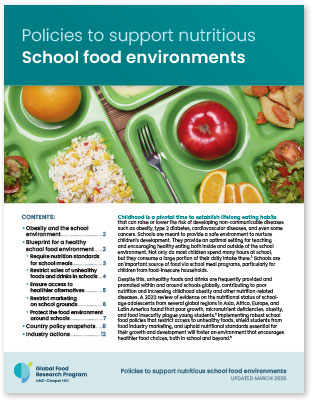 This fact sheet describes how front-of-package labels can help consumers make informed, healthier choices and encourage industry to improve the nutritional profile of their products and portfolios. Learn about the different kinds of front-of-package labels in use around the world today, evidence for different label types, and key considerations and best practices for developing and implementing an effective front-of-package labeling policy.
This fact sheet describes how front-of-package labels can help consumers make informed, healthier choices and encourage industry to improve the nutritional profile of their products and portfolios. Learn about the different kinds of front-of-package labels in use around the world today, evidence for different label types, and key considerations and best practices for developing and implementing an effective front-of-package labeling policy.
Fact sheets

Our fact sheets summarize scientific evidence on key policy and regulatory interventions to improve nutrition and public health. This includes experimental and real-world evidence from evaluations where policies have been implemented, with an effort to include research from around the globe. We designed these fact sheets to provide scholars, policymakers, advocates, journalists, and others with up-to-date information on key topics essential to regulatory efforts.
We update these resources periodically to reflect the latest evidence. Please contact us if you have questions or contributions regarding a particular fact sheet.
 Learn about the connections between excess sugar consumption and prevalence of obesity and other noncommunicable diseases, as well as real-world evidence for how sugary drink taxes can reduce sugar intake, improve health, and increase government revenue while decreasing health care costs and the personal and shared burdens of nutrition-related diseases.
Learn about the connections between excess sugar consumption and prevalence of obesity and other noncommunicable diseases, as well as real-world evidence for how sugary drink taxes can reduce sugar intake, improve health, and increase government revenue while decreasing health care costs and the personal and shared burdens of nutrition-related diseases.
 Fact sheet describing the prevalence and persuasive nature of marketing for unhealthy foods and drinks and its impact on children and adolescents. Learn how food marketing contributes to global childhood obesity and other diet-related diseases, evidence from countries that have implemented policies to restrict food marketing, and evidence-based recommendations for regulations to limit its harms.
Fact sheet describing the prevalence and persuasive nature of marketing for unhealthy foods and drinks and its impact on children and adolescents. Learn how food marketing contributes to global childhood obesity and other diet-related diseases, evidence from countries that have implemented policies to restrict food marketing, and evidence-based recommendations for regulations to limit its harms.
 This fact sheet describes ultra-processed foods and drinks and the threat they pose to public health worldwide as they make up increasingly greater portions of the global diet. Learn how to identify ultra-processed products; review the evidence for their association with a multitude of risk factors, diseases, and mortality; see how ultra-processed foods negatively impact the environment and ecosystems; and explore policy options to reduce consumption.
This fact sheet describes ultra-processed foods and drinks and the threat they pose to public health worldwide as they make up increasingly greater portions of the global diet. Learn how to identify ultra-processed products; review the evidence for their association with a multitude of risk factors, diseases, and mortality; see how ultra-processed foods negatively impact the environment and ecosystems; and explore policy options to reduce consumption.
 Fact sheet describing food and beverage industry voluntary self-regulation in three main areas of public health concern: 1) Child-directed food marketing; 2) front-of-package labelling; and 3) reducing unhealthy nutrients in the food supply. While self-regulation continues to be the most common approach globally for addressing industry’s role in the ongoing obesity crisis, this fact sheet details a large body of independent evidence demonstrating that these measures have been ineffective and insufficient.
Fact sheet describing food and beverage industry voluntary self-regulation in three main areas of public health concern: 1) Child-directed food marketing; 2) front-of-package labelling; and 3) reducing unhealthy nutrients in the food supply. While self-regulation continues to be the most common approach globally for addressing industry’s role in the ongoing obesity crisis, this fact sheet details a large body of independent evidence demonstrating that these measures have been ineffective and insufficient.
 This fact sheet describes the impact of unhealthy school food environments on childhood obesity and wellness. Learn about policies that can improve the school food environment, including setting nutrition standards for school meal programs, restricting access to unhealthy foods and drinks, ensuring access to healthy options, protecting children from food industry marketing, and protecting the food environment around schools. Children need these policies to grow, develop, and succeed at school and beyond the school grounds.
This fact sheet describes the impact of unhealthy school food environments on childhood obesity and wellness. Learn about policies that can improve the school food environment, including setting nutrition standards for school meal programs, restricting access to unhealthy foods and drinks, ensuring access to healthy options, protecting children from food industry marketing, and protecting the food environment around schools. Children need these policies to grow, develop, and succeed at school and beyond the school grounds.